Russia suffering 'environmental catastrophe' after oil spill in Kerch Strait
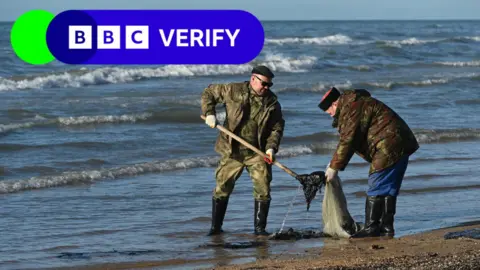 Reuters
ReutersSatellite images reviewed by BBC Verify have shown a major oil slick spreading across the Kerch Strait that separates Russia from annexed Crimea, a month after two oil tankers were badly damaged in the Black Sea.
Oil has leaked into the strait from two ships which ran into trouble during bad weather on 15 December. Volgoneft-239 ran aground following the storm, while Volgoneft-212 sank.
Up to 5,000 tonnes of oil has now leaked, and media reports and official statements analysed by BBC Verify suggest the spill has spread across the Black Sea and the Sea of Azov.
A senior Russian scientist called the spill the country's worst "environmental catastrophe" of the 21st Century.
"This is the first time fuel oil has been spilled in such quantities," Viktor Danilov-Danilyan - the head of science at the Russian Academy of Sciences (RAS) - said in a 17 January interview with a Russian newspaper.
Russian scientists said in December that this spill could be more than twice the size of a similar disaster in the strait in 2007, which saw up to 1,600 tonnes of heavy oil leak into the sea. Ukraine's ministry of ecology has estimated that the clear up from the latest spill could cost the Russian state up to $14bn (£11.4bn).
Paul Johnston, a scientist at Greenpeace Research Laboratories, said "there's always an element of uncertainty around oil spills", but a lack of timely information has heightened this uncertainty further.
"I'm not entirely optimistic we'll ever know the full extent of the problem," he added.
Satellite images reviewed by BBC Verify on 10 January - the most recent available high-resolution photos - showed a massive oil slick running through the strait, measuring at least 25km (15 miles) long. A second, smaller slick measuring around 5.7km (3.5 miles) long is also visible.
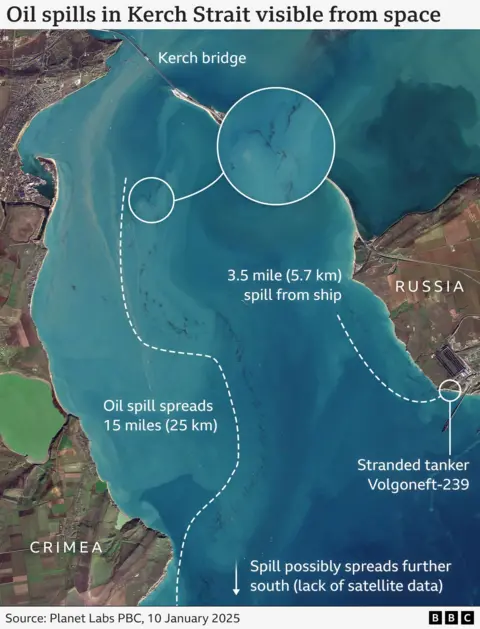
Mr Danilov-Danilyan said that oil could "by late January reach Odesa" in southern Ukraine and "one cannot rule out" it travelling as far as the coasts of Romania, Bulgaria and Turkey.
In a statement to BBC Verify, a spokesperson for Greenpeace said the group estimated that oil from the spill now covered an area totalling up to 400 sq km.
The spill appears to have moved quickly after the initial incident. On 24 December, satellite images reviewed by BBC Verify showed oil accumulating on a beach in Anapa - some 40 miles from the strait.
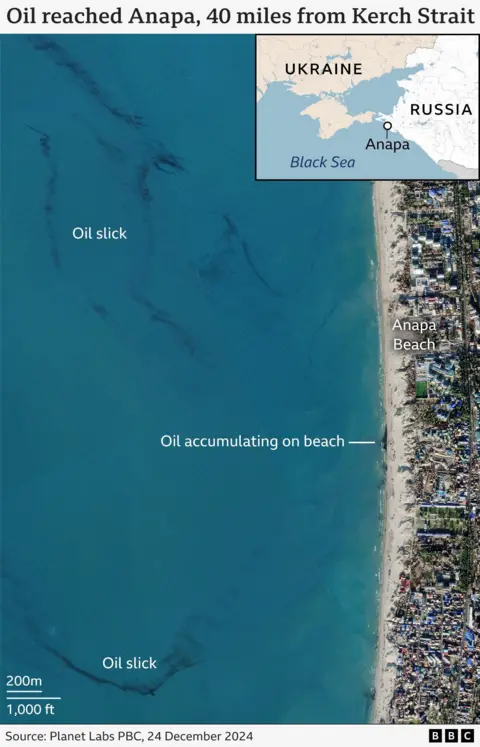
BBC Verify has analysed reports in Russian media, statements from officials and Greenpeace releases from this month that talk about oil being found or cleared up on various beaches.
The reports suggest that the oil has now spread as far north as the occupied city of Berdyansk in Ukraine and as far south-west as Lake Donuzlav on the Crimean Peninsula, which Russian illegally annexed in 2014.
The leak involves heavy M100-grade fuel oil that solidifies at a temperature of 25 degrees Celsius.
A Greenpeace spokesperson told the BBC that M100 doesn't stay on the water's surface for long. Once underwater, it is "technically impossible to neutralise", and can take decades to be biodegraded by marine micro-organisms.
Footage recorded by the Russian NGO The Earth Touches Everyone and included below appeared to show large amounts of heavy oil accumulating on the seabed.
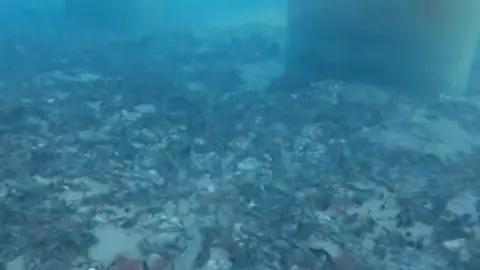 The Earth Touches Everyone
The Earth Touches EveryoneSome experts have warned that the leak has heavily impacted marine life in the region. Footage authenticated by BBC Verify has shown birds covered in oil.
It is not known exactly how many animals have been harmed by the spill.
Overall, Russian officials say about 6,000 birds have been delivered to "rehabilitation centres" on the Russian mainland, but it is unclear how many of them will survive. A local bird sanctuary in Stavropol territory said of 1,051 birds affected by the oil spill that have been delivered to them only about 17% have survived.
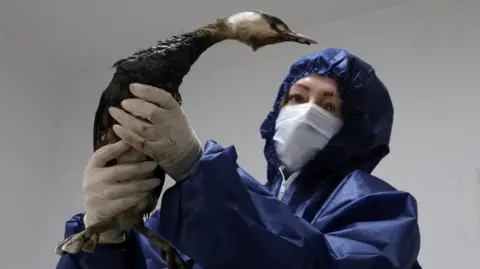 Reuters
ReutersGreenpeace told BBC Verify that the final number of dead birds could be far higher, citing the 12,000-13,000 killed by the 2007 spill in the strait.
A dolphin rehabilitation centre in Russia's Krasnodar Territory told Interfax news agency that around 70 dead dolphins have been discovered on the shores following the latest oil spill.
"This is a horrific blow to the ecosystem," Mr Danilov-Danilyan told Russia media. He predicted the death of "tens of thousands of birds, many dolphins, [and] big losses in the coastal flora and fauna".
"Practically nothing, other than microorganisms that feed on fuel oil and break it up, can live in that sort of environment, even in salt water. The removal of 200,000–500,000 tonnes, at least, of contaminated soil too will not go without consequences, and will certainly lead to a reshaping of the coast," he said.
Dmitry Lisitsyn, Executive Fellow at Yale University's School of the Environment, told BBC Verify that under Russian safety regulations these types of tankers are barred from leaving rivers in winter.
"Those ships are not intended for high waves, they are very long with a shallow draught," he said.
Questions have also been raised about the seaworthiness of the vessels, which are both over 50 years old, according to Marine Traffic.
Footage released by Russian authorities showed the bow of one tanker completely broken off during the incident, with streaks of oil visible in the water. The captains of both vessels have been arrested and criminal investigations have been opened into the incident.
Ukrainian activists have accused the ships of being part of Russia's so-called shadow oil fleet. Moscow has been accused of using the so-called ghost fleet of tankers, which are often poorly maintained and lack proper insurance, to move oil and circumvent sanctions, though analysts the BBC has spoken to could not confirm the claims.
Experts say the long-term fallout from the spill may not be limited to just Russia.
"In general, Russia has suffered more than any other country so far from the Kerch Strait accident," Dmitry Markin of Greenpeace said.
"However, the majority of the leaked fuel oil is still in the sea. Therefore, the long-term consequences for the occupied territories of Ukraine may be no less severe."
Graphics by Erwan Rivault.

